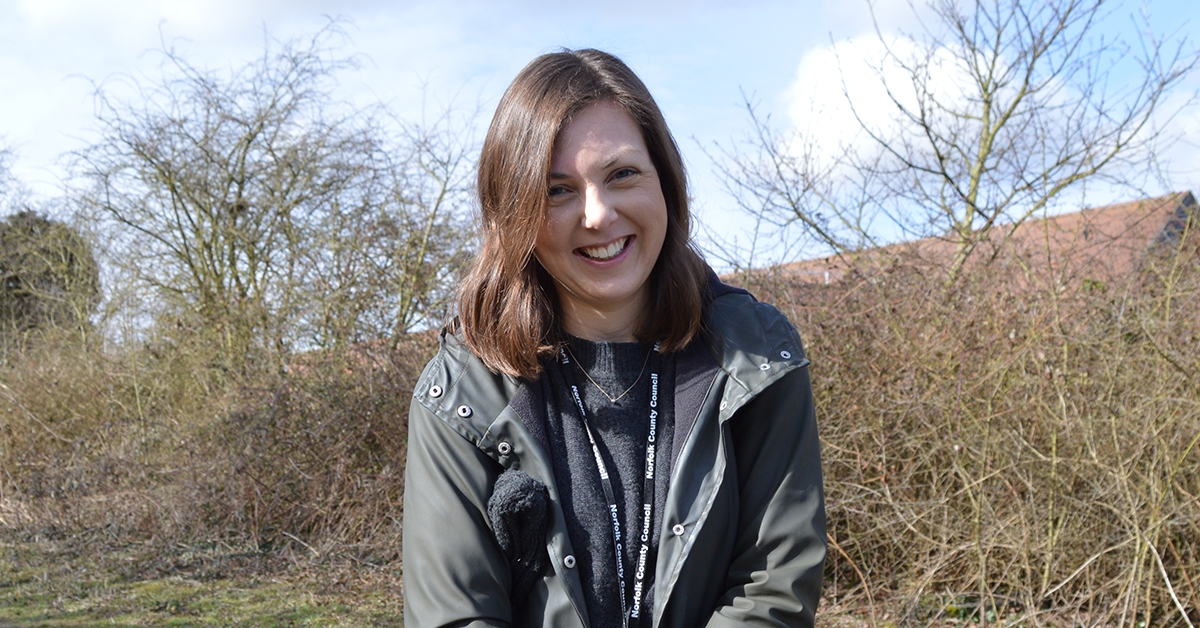
Madeleine Goodall is Humanists UK’s new Heritage Coordinator, leading our Humanist Heritage Project, celebrating the 125-year history of Humanists UK.
Hi Maddy. Can you tell us a bit more about your work?
As Humanist Heritage Coordinator, I am working on a project to research, share, and celebrate the long history of humanism in the UK. We’re building a website to share this heritage, and coordinating a programme of events next year to celebrate the 125th anniversary of Humanists UK. This means tracing the development and influence of humanist ideas from their earliest emergence to today, identifying those whose life and works have exemplified a humanist value system, and highlighting individuals who have contributed to a deeper understanding of the world and humankind.
Tell us more about the Humanist Heritage Project
Next year marks 125 years since Humanists UK’s foundation in 1896, as the Union of Ethical Societies. In the course of my research I’ve been especially inspired by humanist women, many of whom fought hard for change but have been little remembered.
Lillie Boileau (1870-1930), for example, was arrested in 1909 alongside other members of the Women’s Freedom League attempting to present a suffrage petition to Prime Minister Herbert Asquith. Boileau was a devoted member of the Ethical Union for over thirty years, helping to found its Women’s Group, and described by Gustav Spiller as ‘one of its most intelligent, loyal and sympathetic collaborators.’
Another active Union member was May Seaton-Tiedeman (1864-1948), who was, despite her own happy marriage, a ‘courageous and indefatigable campaigner’ as part of the Divorce Law Reform Union, unfairly eclipsed by more famous figures like Arthur Conan Doyle. In fact, after the Matrimonial Causes Act 1937 was passed, which extended the grounds for divorce to include cruelty, desertion and incurable insanity, Arthur Denner Howell Smith (also an Ethical Union member) wrote to The Times to protest the absence of Seaton-Tiedeman’s name in coverage of the bill’s success. Attempting to set the record straight, he described how for ‘25 years, in season and out of season… Mrs. Seaton-Tiedeman has worked for divorce law reform, sparing neither her health nor her purse.’
These women and so many others, motivated by their humanist values, challenged societal norms and battled for reform, risking reputation, reprimand, and even imprisonment.
What aspirations do you have for the Humanist Heritage Project?
Humanism’s heritage is deeply intertwined with all kinds of major historical changes, and populated by innumerable influential and well-known individuals. While it’s exciting to showcase these, I’m particularly looking forward to bringing to light some of the lesser known stories and forgotten figures. The archive at the Bishopsgate Institute holds minute books, annual reports, programmes of events, and personal collections associated with the various ethical societies which made up the Union of 1896.
Within these are names like Ernestine and Herbert Henry Mills, an enamellist and doctor, who were members of the West London Ethical Society from 1899. Ernestine (1871-1959) was an accomplished artist, who produced pieces for suffrage societies like the Women’s Social and Political Union (WSPU) and the Women’s Freedom League (WFL), held today in collections at the Museum of London and the V&A. She also created a memorial plaque for Stanton Coit’s so-called Ethical Church, commemorating the life of Zona Vallance (writer, suffragist, and first secretary of the Union of Ethical Societies – essentially, Andrew Copson’s earliest predecessor as Chief Executive) who died at just 44 in 1904. Dr Herbert Henry Mills (1868-1947) was the family physician of the Pankhursts, as well as serving on the advisory council for the National Insurance Act of 1911, which helped to pave the way for today’s welfare state.
Membership lists of the societies also include figures like the later Prime Minister Ramsay MacDonald (an early chair of the council), the author Leslie Stephen (father of Virginia Woolf), and people like Emilie Holyoake Marsh, whose involvement with the Union is often little mentioned in their biographies, if at all. These individuals were drawn to the societies’ stated principles of living a ‘good life’, which rested ‘on no external authority, and on no system of supernatural rewards and punishments, but on the nature of man, as a rational and social being.’ These guiding values inspired significant efforts towards reform, innovation, and social change, and these people are very much a part of the humanist story.
Do you have any favourite finds?
This could be a long list, but as a devotee of ephemera, I do have some favourite items from the archives. George Jacob Holyoake’s 1842 arrest warrant on charges of blasphemy is a striking document, and serves to underscore the horror with which his comment that he ‘would place the Deity on half pay’ was received. I also love the 1850 letter from Eliza Sharples (previously joined in a ‘moral marriage’ to radical publisher Richard Carlile) in which, expressing to Thomas Cooper her ineptitude in the business of running a coffee house, she nevertheless stands by her guiding motivation, stating: ‘I must ever have for my motto “Free Discussion” let happen what may.’
What attracts you to humanism?
Like a lot of people, I was a humanist long before I described myself as one. I have never been a believer in any religious sense, but have always felt strongly that we should live compassionate, thoughtful, and engaged lives, and that death being final gives the life we have now its ultimate meaning. Learning more about the long and active history of humanism in the world, as well as what Humanists UK does today, has confirmed that I am very much at home in humanism.
How can people find out more about the Humanist Heritage Project
The Humanist Heritage website will launch later this year, so please do pay a visit when it’s up and running. In the meantime, if you have any thoughts, insights, or suggestions, please email heritage@humanists.uk.

